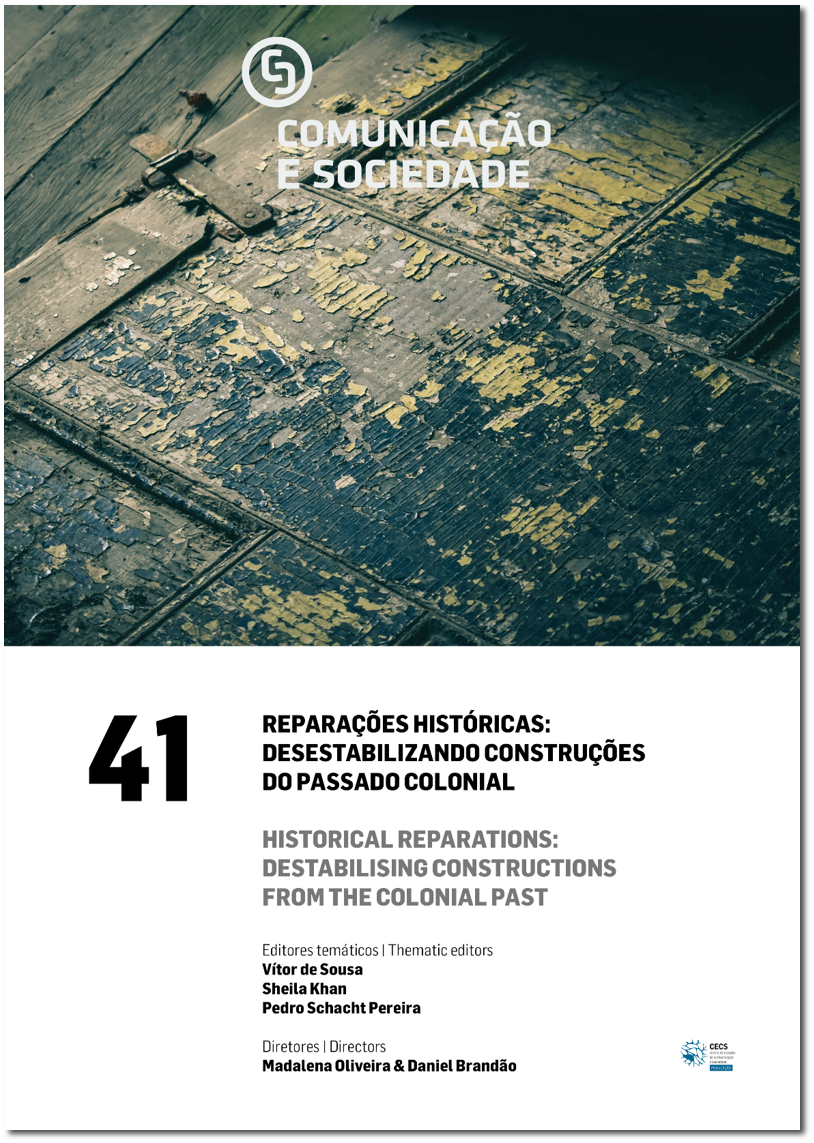On How Post-Colonial Fiction Can Contribute to a Discussion of Historical Reparation: An Interpretation of As Telefones (2020) by Djaimilia Pereira de Almeida
DOI:
https://doi.org/10.17231/comsoc.41(2022).3681Keywords:
African-descendant, Djaimilia Pereira de Almeida, border thinking, the decolonial project, historical reparationAbstract
Post-colonial Portuguese literature published since 1974 has obscured the trauma of the colonised. In the context of Portuguese prose fiction published since the beginning of the second decade of the present millennium, authors of African descent follow on from the generation that brought about the African liberations. However, due to the years of political and economic instability that followed in the former colonies, these writers became part of the African-heritage diaspora that has grown up in Portugal. As such, they form the visible face of the post-colonial cultural entanglement that was produced by colonialism. Djaimilia Pereira de Almeida, the author of As Telefones (The Telephones, 2020), the novel that is the focus of this article, provides an example of African-heritage writing and lived experience that has points of reference in Portuguese and Angolan cultures alike. This article argues that Portuguese prose fiction by authors of African descent destabilises cartographical imaginaries to reflect on the cultural complexity of the lived experience of people of African descent, contributing to a polyphony that has been absent from collective memory in the public space, and consequently creating possibilities for historical reparation. This article maintains that, on the one hand, As Telefones decolonises the experience of loss that literature published after 1974 has associated not only with the memory and experience of the coloniser’s body, but also and significantly, with the feeling of saudade (nostalgia or longing) that is so central to Portuguese culture; on the other, it argues that the narrative focus on the telephone as the sole means of transmission of post-memory introduces a rupture in Portuguese literary convention — in which writing is a privileged witness — by endorsing the orality that feeds into the origins of African literatures.
Downloads
References
Agualusa, J. E. (1997). Nação crioula: Correspondência secreta de Fradique Mendes. Dom Quixote.
Almeida, D. P. de. (2015). Esse cabelo. Editorial Teorema.
Almeida, D. P. de. (2018). Luanda, Lisboa, paraíso. Companhia das Letras.
Almeida, D. P. de. (2020). As telefones. Relógio d’Água.
Carvalho, A. de, Fernandes, C., Lima, C., Graça, C., Carlos, C., Pires, D., Sambo, D., luZGomes, & Tê, T. A. (2017). Djidiu: A herança de ouvido. Vadaescrevi.
Chaves, R. (1999). A formação do romance angolano: Entre intenções e gestos. FFCLCH/USP.
Ferreira, A. P. (2014). Lusotropicalist entanglements: Colonial racisms in the postcolonial metropolis. In A. Klobucka & H. Owen (Eds.), Gender, empire and postcolony: Luso-Afro-Brazilian intersections (pp. 49–68). Palgrave Macmillan. DOI: https://doi.org/10.1057/9781137340993_4
Ferreira, P. M. (2021). Órfãos do império: Heranças coloniais na literatura portuguesa contemporânea. Imprensa de Ciências Sociais.
Hirsch, M. (2012). The generation of postmemory: Writing and visual culture after the holocaust. Columbia University Press.
Khan, S. (2015). Portugal a lápis de cor. A sul de uma pós-colonialidade. Almedina.
Lourenço, E. (1984). Dez anos de literatura portuguesa (1974-1984): Literatura e revolução. Revista Colóquio/Letras, 78, 7–16.
Lucas, I. (2015, 2 de outubro). “Uma rapariga africana em Lisboa”. Entrevista com Djaimilia Pereira de Almeida. Público. https://www.publico.pt/2015/10/02/culturaipsilon/entrevista/uma-rapariga-africana-em-lisboa-1709352
Lucas, I. (2018, 20 de dezembro). Djaimilia Pereira de Almeida: Não é só raça, nem só género, é querer participar na grande conversa da literatura. Público. https://www.publico.pt/2018/12/20/culturaipsilon/noticia/djaimilia-1854988
Mata, I. (2014). Literaturas em português: Encruzilhadas atlânticas. Via Atlântica, 25, 59–82. https://doi.org/10.11606/va.v0i25.69870 DOI: https://doi.org/10.11606/va.v0i25.69870
Medeiros, P. de. (2020). Memórias pós-imperiais: Luuanda, de José Luandino Vieira, e Luanda, Lisboa, paraíso, de Djaimilia Pereira de Almeida. Língua-Lugar: Literatura, História, Estudos Culturais, 1(1), 136–149. https://doi.org/10.34913/journals/lingua-lugar.2020.e211 DOI: https://doi.org/10.34913/journals/lingua-lugar.2020.e211
Mignolo, W. (2017). Desafios decoloniais hoje. Revista Epistemologias do Sul, 1(1), 12–32. https://revistas.unila.edu.br/epistemologiasdosul/article/view/772
Monteiro, Y. (2018). Essa dama bate bué. Guerra e Paz.
Observatório das Migrações. (s.d.). Nacionalidades dos residentes. Alto Comissariado para as Migrações. https://www.om.acm.gov.pt/-/sabia-que-em-portugal-residem-perto-de-400-mil-estrangeiros-de-180-nacionalidades-diferentes-
Ribeiro, A. S., & Ribeiro, M. C. (2018). A past that will not go away. The Colonial War in Portuguese postmemory. Lusotopie, 17(2), 277–300. http://doi.org./10.1163/17683084-12341722 DOI: https://doi.org/10.1163/17683084-12341722
Rothberg, M. (2009). Multidirectional memory: Remembering the Holocaust in the age of decolonization. Stanford University Press.
Said, E. (1993). Culture & imperialism. Chatto & Windus.
Sapega, E. (1997). No longer alone and proud: Notes on the rediscovery of the nation in contemporary Portuguese fiction. In H. Kaufman & A. Klobucka (Eds.), After the revolution: Twenty Years of portuguese literature 1974-1994 (pp. 168–186). Bucknell UP.
Wieser, D. (2020, 7 de dezembro). “As minhas raízes são africanas e as minhas asas são europeias”, entrevista a Yara Monteiro. Buala. https://www.buala.org/pt/cara-a-cara/as-minhas-raizes-sao-africanas-e-as-minhas-asas-sao-europeias-entrevista-a-yara-monteiro
Downloads
Published
How to Cite
Issue
Section
License
Copyright (c) 2022 Margarida Rendeiro

This work is licensed under a Creative Commons Attribution 4.0 International License.
Authors own the copyright, providing the journal with the right of first publication. The work is licensed under a Creative Commons Attribution 4.0 International License.












